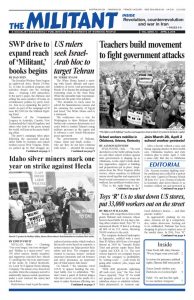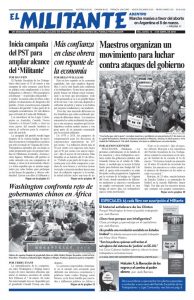“We have never considered the idea of fabricating nuclear weapons, because we don’t need them,” former Cuban President Fidel Castro said in a 2005 book-length interview with Spanish journalist Ignacio Ramonet, published under the title My Life. Castro was rebutting a U.S. government slander that Havana was aiding Tehran in developing a nuclear arsenal.
“What’s the purpose of producing a nuclear weapon when your enemy has thousands of them?” Castro said. “It would be entering an arms race all over again. No one should have the right to produce nuclear weapons, much less the privileged right demanded by imperialism to impose its hegemonic domination” on the world.
Returning in that interview to Cuba’s refusal to develop weapons of mass destruction, Castro said: “Who are you going to use it against? Against the American people? No! That would be unfair and absurd! Are you going to make a nuclear weapon? You’ll ruin yourself — a nuclear weapon is a good way to commit suicide at a certain point.” And “you’re going to do that against the entire world’s public opinion.”
More than a decade later, in remarks to the seventh congress of the Communist Party of Cuba in April 2016, Castro said, “The greatest danger hanging over the earth today derives from the destructive power of modern weaponry, which could undermine the peace of the planet and make human life on earth’s surface impossible.”
As opposed to such horrors, Castro told students at the University of Havana in November 2005, the Cuban people and their socialist revolution “possess a weapon as powerful as nuclear power. It is the immense justice for which we are struggling.”

